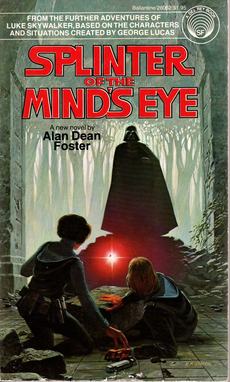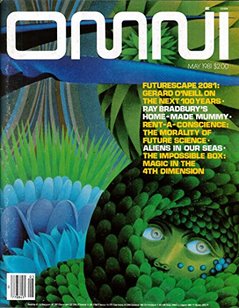 Over the past week, news spread across the skiffy slices of cyberspace that Penthouse has acquired OMNI magazine, and that the magazine will be printed later this year. It's news that fills me with incredible pleasure. This year has been a dumpster fire since November 2016, and shows signs of spreading with each passing month. From the trillion-ton iceberg separating from Antarctica to the prospect of having tardigrades outlive us all, I have had to seek solace wherever I can. The new season of Twin Peaks (and my subsequent resurgent interest in David Lynch's work) offers much-needed cognitive dissonance (however grim). A resurgent OMNI may offer another. OMNI was not my first exposure to science fiction--that occurred when my mother allowed me to stay up to watch Star Trek when I was six--but it resulted in the same sort of life-changing effect as Roddenberry's wagon train to the stars. While media sf of varying quality presented me with the images that fueled my preadolescent imagination, I knew almost nothing about its print counterpart beyond the novelization of Star Wars and its sequel The Splinter of the Mind's Eye and the Victorian adventures of H. G. Wells, Arthur Conan Doyle, and Robert Louis Stevenson. One of my teachers, seeing my interest in fantastic literature, recommended Ray Bradbury's The Martian Chronicles to me, which I promptly checked out from the school library. Some of its stories resonated with me ("The Third Expedition" and "Usher II" terrified me to the point that I left my closet light on for at least a month), but its future seemed wrong, especially as I was devouring news about the impending launch of the space shuttle Columbia and absorbing episodes of Carl Sagan's Cosmos on PBS. During a trip from Houston to Austin at the beginning of the summer of 1981, we stopped at a convenience store for soft drinks and so that I could find something to read. I purchased the May issue of OMNI, which promised a glimpse of the year 2081 and also featured a story by Ray Bradbury. In its pages I also discovered a story called "Johnny Mnemonic," by a writer I had never heard of, William Gibson. For 90 miles I read Gibson's story to have my mind blown by a story featuring a man with a computer in his head, an assassin with retractable razor wire spooled in a hollow finger, and a dope-addled dolphin that spoke through a board embedded with light bulbs. I understood maybe a quarter of what was happening, but I could feel its world rewiring my brain. It became my mainstay. The magazine always included interesting science articles, compelling interviews, and even opened up a Speaker's Corner for fringe science topics. But mostly, I purchased it for the fiction: the diversity of ideas and approaches, the infusion of several genres in what was ostensibly a science fiction magazine, and the quality of the writing. It was the Galaxy magazine of the computer age. It was here I discovered writers who taught me much about crafting stories: Harlan Ellison, Robert Silverberg, Gardner Dozois, Octavia Butler. In its pages I discovered Dan Simmons (through the novella version of "Carrion Comfort"), Jonathan Carroll (who, in "Mr. Fiddlehead" and "The Dead Love You," showed how you could upend not just genre conventions but narrative conventions themselves), and Ted Chiang. OMNI also not only exposed me to modern horror fiction beyond Stephen King (in the guise of George R. R. Martin "The Pear-Shaped Man," which made me unable to eat Cheetos for a full year) but also introduced me to Clive Barker. The stories also featured illustrations by H. R. Giger, Rallé, and other surrealistic artists who evoked the strangeness of each story. I began picking up the digest magazine as well, something I had initially avoided because of the grainy paper. I purchased my first issues of Isaac Asimov's Science Fiction Magazine because of Michael Swanwick "The Man Who Met Picasso," and became a reader of The Magazine of Fantasy and Science Fiction after I learned that Lucius Shepard published there regularly. And I actively sought the novels and collections of those who appeared in it's slick pages. I tried keeping up with it after college, but by then magazine purchases were more rare, and missed it altogether when it switched to online publication because I did not have regular internet access until 1999. But what I thought of as an OMNI story stayed with me: strong prose, literary approaches, interesting ideas. I missed the magazine, but I found similar material elsewhere. And now it's back. I wonder how much its return is driven by nostalgia; the past has overrun us with in the guise of remakes, sequels, the return of television shows we thought long dead. Even with the return of my favorite magazine I have to ask myself if this is something I really want. It was important to me at a specific time, and is fixed in my mind in the 1980s. I'm hoping it will work. It will work as long as it understands the world is different now. We need science education to brighten this dark age now more than ever. And we need fiction that will help illuminate it.
0 Comments
Leave a Reply. |
Derek Austin Johnson has lived most of his life in the Lone Star State. His work has appeared in The Horror Zine, Rayguns Over Texas!, Horror U.S.A.: Texas, Campfire Macabre, The Dread Machine, and Generation X-ed. His novel The Faith was published by Raven Tale Publishing in 2024.
He lives in Central Texas. Archives
May 2024
Categories |


 RSS Feed
RSS Feed